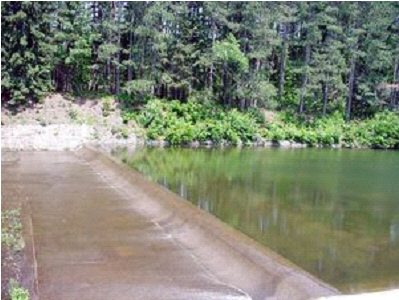Water Conservation
Why should we conserve water? I think that’s a good question and one with many answers. No one will put himself or herself out without understanding why they’re doing it, so let’s start with some water basics.
The water we have today is the same water that has been on earth for millions of years. Yes, perhaps the dinosaurs drank the same water you’re drinking now. Water is constantly being recycled and there is no such thing as “new water,” just “previously owned” water.
Due to recycling, our water really belongs to the entire earth. We hear on the weather reports that a storm is coming, fueled by Gulf (Gulf of Mexico) moisture. Water evaporates from the Gulf, condenses to form clouds and precipitates on us as rain or snow.
That’s the Water Cycle: Evaporation, Condensation and Precipitation. We now have water from the Gulf of Mexico in our lakes, rivers, creeks and ground. Some water will evaporate and go right back into the cycle. The rest slowly finds its way to the Atlantic Ocean, where it can eventually evaporate, condense and fall almost anywhere in the world. Yes, water is a world traveler.
Whether we have a water company or private well, we have one thing in common. We rely on rain for our water. All the water we use can only be replaced by rain.
Our ground has a limited capacity to store water, and no one knows what that limit is. Our aquifers and lakes are like big water storage tanks. Once they’re filled, you can’t put more in. But no one knows the size of the tank or when it will be empty.
Now, let’s make up a story to demonstrate a point. This isn’t a fairy tale because it’s based on scientific facts.
Assume our ground and lakes are filled to capacity with water. Now everyone in the county leaves for a long vacation, so that no one is using water. Everyone is gone for a year and, during that time, not a single drop of rain falls. We all come home and what do we find?
The first thing we’ll notice is the creeks are dry and our lakes hold little, if any water. Many private wells have gone dry; maybe the water companies’ wells are dry too.
What happened to all that water? We were filled up when we left and no one used any!
The answer is simple: water is always on the move. We know water runs downhill, and it’s this movement that feeds surface water. Most of the water in our lakes, rivers and creeks was once groundwater. With no rain to replenish the groundwater, it all drained away and we ran out of water.
In this story, it took a year with no rain for this to happen. How long would it take our aquifers to go dry if everyone was home and using water? No one knows the answer.
Yes, that was a made-up story, but it’s based in fact. We’re all walking a tightrope, relying on rain to put back the water we use. And that rain has to soak into the ground for us to use it.
The summer of 2005 was dry, but not of drought proportions. Still, wells in Carbon County went dry and had to be drilled deeper. This is now a common occurrence.
In some areas of the county, groundwater levels are falling despite normal rainfall. Shallow wells, which were fine for decades, are going dry and must be drilled deeper or replaced with a new well. The reason this is happening is the groundwater is not being recharged as it once was.
Lack of recharge is caused by development, or should I say overdevelopment? Remember, there is a limited capacity for storing water, water has to soak into the ground to be of use, and if our use exceeds the recharge rate, we are going to run out of water.
Every building, road, parking lot, driveway and anything else that covers the ground is an impervious surface, preventing water from soaking into the ground, and this generates runoff. This runoff, in most cases, heads straight for our creeks instead of being stored underground.
Of course, with development come the people who use water, so it’s a double whammy. We have more people using water, and less recharge of the aquifers. The net result is less water available to everyone.
Don’t get me wrong. I’m not against development. The population is growing and people have to live somewhere. New development can have a very positive impact on a community, as long as it is done with proper planning.
Local planners make decisions on housing density, shopping malls and other development. This has to be done wisely and probably with help from environmental experts. Sound decisions must be made to prevent irreparable damage, which could have a long-term effect on the quality of life in the community.
If we conserve the water we have, there will be more water available during a drought. There’s no way around it. People use water and then it’s gone. If we don’t receive adequate rainfall, we will run out of water.
Isn’t that a good reason to conserve water?

